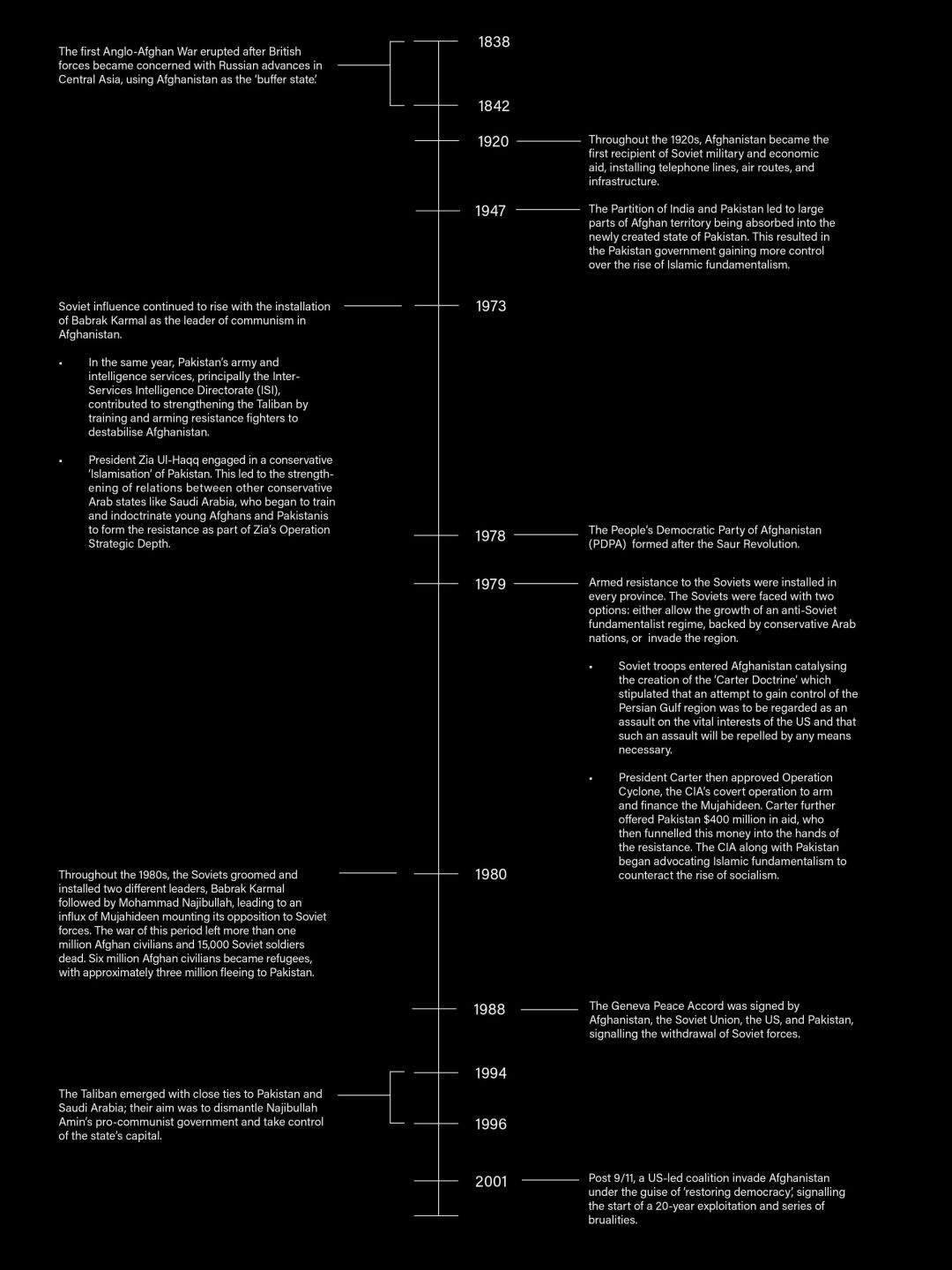Solidarity is a powerful concept. It chips away at notions of borders and barriers which create a reluctance to stand for justice. As we have witnessed after the murder of George Floyd in the United States, there seems to be a paradigm shift in the way users of social media consume information about foreign politics. The mainstream media, once seemingly legitimate and unquestionable, is now subject to justified criticism as audiences examine the ulterior motives behind each media outlet and how they frame these issues and topics.
The crisis unfolding in Afghanistan right now has undoubt-edly shaken the roots of Western interventionism, once again bringing it to the forefront of current affairs. To understand the situation in Afghanistan is to ackn-owledge the dangerous propaganda created by US and Western media platforms to justify the historical and ongoing occupation of Afghanistan. For us to stand with the people of Afghanistan, we must learn the narratives that have been widely dismissed.
THE GREAT GAME
The invasion of Afghanistan, referred to by British officers as ‘The Great Game’, has been one of the largest and longest military operations by imperial forces. The Great Game between England and Russia can be traced back to 1830, lasting throughout the 19th century. The Durand Line, viewed by many Afghans as an arbitrary and involuntary agreement, has continued to complicate the relationship between Afghanistan and bordering nations like Pakistan. Previously, the British sent diplomat Sir Mortimer Durand to negotiate a partition between Afghanistan and British-India, without the consent of the Afghan population. This period of tensions resulted in three major Anglo-Afghan wars, which saw King Abd al-Rahman Khan accept the Durand Line and forfeit large amounts of land to the British Raj.
During the Cold War, both the US and the Soviet Union attempted to gain a foothold in Afghanistan, through the instalment of infrastructure and military intervention. Between the Soviet intervention and US support of the Afghan anti-communist fighters, imperial powers have long been waging covert wars, leading to devastating effects on the region.

In recent news, the US has decided to withdraw all its troops from Afghanistan, closing a 20-year chapter of brutal exploitation, unjustified interventions, and destabilisation. However, American intervention in this region actually began some decades earlier. In 1987 alone, the US contributed approximately $680 million in military aid to the Mujahideen — the warriors of Afghan resistance who had been established as part of a campaign to maintain anti-communist sentiments in Afghanistan.
To understand the reality of the Taliban takeover in the contemporary climate, and what it means for the peoples of Afghanistan, we must be aware of the multiple external powers that have created the Afghanistan that we know of today. The US capitalised on the anti-communist sentiments shared by the Mujahideen and successfully drove the Soviets out of Afghanistan. From 1994 onwards, the Taliban have implemented an ultraconservative ideology, wreaking havoc upon those who opposed their beliefs. This would not have been possible without the direct influence of the US, whose primary aim was to establish the United States as the lead player in a global game of guerrilla politics.
From Mujahideen to US and Pakistan-backed Taliban – how did we get here?
The Mujahideen originally emerged as a reaction to the ‘godless communist agenda’ of the PDPA. They are not a single group of people, but instead are divided into four main factions: a regressive, traditionalist group led by Gulbuddin Hekmatyar; a more moderate faction led by Ahmed Shah Massoud; leftist groups that felt disillusioned by the government; and the fourth group of ordinary people who armed themselves with weapons but no ideology.
In any case supporting the Mujahideen, for Pakistan and the US, was the cornerstone of imperial victory. From the Mujahideen, onto the emergence of the Taliban, what is evident is that the Taliban is not a new phenomenon, but a calculated strategy that imperial powers have used as a crutch to defend its presence in Afghanistan.
The Taliban have been responsible for some of the most horrendous acts of violence against religious minorities including Hazara people (most notably the 1998 Mazar-e-Sharif genocide in which thousands of Hazara people were brutally massacred). This would not be possible without Pakistan and the US perpetually providing military aid to the Taliban — an indication of political ambitions and the greed of leaders — and the economic gains received from its supply and trade of opium.
The 2001 US occupation of Afghanistan has crumbled the social and economic fabric of the country. A US-led coalition launched ‘Operation Enduring Freedom’, which officially aimed to target the Taliban with military strikes but covertly led to the murder of millions of Afghan civilians — with some evidence of strikes explicitly aimed at civilian villages. Australia must also be held to account for these unjust wars. The groundbreaking findings of Major General Paul Brereton’s investigation reveal that Australia’s special forces deployed in Afghanistan have been guilty of heinous war crimes that have shaken the legacy of the defence force. Australian troops were documented to have murdered several unarmed civilians in what is referred to as the ‘single deadliest atrocity of the entire Afghanistan war’.
In true imperial nature, the US first aided and abetted a brutal regime to align with its anti-communist agenda. Once its interests had been achieved, the US began to frame its involvement in Afghanistan as a necessary step to ‘restore democracy’ in the region — leaving the people ill-equipped to deal with the oppressive policies of the Taliban. Meanwhile, in the perspective of multinational defence contractors like Northrop Grumman, Lockheed Martin, and Boeing, the war on Afghanistan brought about copious wealth and economic benefits.
Call to action — what can non-Afghans do to help?
Afghanistan has long been dissected, analysed, and debated upon by those in the West who are evidently detached from the experiences of imperialism, colonisation, and exploitation. Somewhere in the battle between the right and the left, the voices of Afghan people have been forgotten.
What the people of Afghanistan need the most at this moment is a shift in perspective. A realisation that this land and her people have been perpetually silenced. The ousting of US-backed President Ashraf Ghani and the official takeover by the Taliban signals growing concerns for the safety of Afghan citizens. Centuries of war, exploitation, and destabilisation have left the people of Afghanistan in a limbo — unable to return home, yet unable to seek refuge in countries like Australia, who hold equal responsibility for damaging the region in the name of our own national interests.
In order to be a true ally, stand by the truth, and support the movement to reclaim the narrative, it is imperative that we listen to the voices coming from Afghanistan. Although the withdrawal of US troops from Afghanistan seemed like an unattainable dream, we must not forget the threat of the Taliban and whose interests they have historically served. We must be wholly invested in seeking the establishment of peace for the people of Afghanistan, by the people of Afghanistan.
In the age of misinformation, it is crucial that we do our part by learning the bitter realities of foreign intervention, its impact on countries like Afghanistan, and how we as non-Afghans can do better in our allyship. Below are some resources if you would like to learn more about foreign involvement in Afghanistan and its impact on Afghan civilians.
Resources for Further Reading:
Books:
- Selected Writings of Eqbal Ahmad by Eqbal Ahmad
- Games Without Rules: The Often-Interrupted History of Afghanistan by Tamim Ansary
- Terrorism: Theirs and Ours by Eqbal Ahmad
- No Good Men Among the Living: America, the Taliban, and the War through Afghan eyes by Anand Gopal
- Iraq, Afghanistan, and the Imperialism of Our Time by Aijaz Ahmad
Podcast Episodes:
- ‘Another empire falls in Afghanistan w/ Shah Mahmoud Hanifi’, The East is a Podcast
- ‘Faith Must Be A Part of Anti-Imperialist and Anti-Capitalist Movements’, By Any Means Necessary
- ‘US reaps the chaos it has sown in Afghanistan’, Any Means Necessary
- ‘After the Afghan evacuation’, Today, Explained
- ‘Taliban 2.0’, Today, Explained
Instagram accounts:
- @khalqcollective
- @bamiyan
- @burqasandbeer
- @estaarback
- @afghansempowered
- @blingistan
REFERENCES
1. Ahmad, E., Bengelsdorf, C., Cerullo, M., Chandrani, Y., Chomsky, N. 1999, Selected Writings of Eqbal Ahmad, Columbia University Press.
Bloch, H., ‘A Look at Afghanistan’s 40 Years of Crisis – From the Soviet War to Taliban Recapture’, NPR.org, < https://www.npr.org/2021/08/19/1028472005/afghanistan-conflict-timeline>.
Greentree, T., ‘Afghanistan: Remembering the long, long war we would rather forget’, War on the Rocks, < https://warontherocks.com/2019/02/afghanistan-remembering-the-long-long-war-we-would-rather-forget/>.
Human Rights Watch, Afghanistan: The Massacre in Mazar-e-Sharif, November 1998 Vol. 10, No. 7, < https://www.hrw.org/legacy/reports98/afghan/Afrepor0.htm>.
Kaura, V. 2017, ‘The Durand Line: A British Legacy Plaguing Afghan-Pakistani Relations’, Middle East Institute, < https://www.mei.edu/publications/durand-line-british-legacy-plaguing-afghan-pakistani-relations>.
Schwarz, J., ‘$10,000 invested in Defense stocks when Afghanistan war began now worth almost $100,000’, The Intercept, <https://theintercept.com/2021/08/16/afghanistan-war-defense-stocks/>.
Stewart, E. 2021, ‘The history of US intervention in Afghanistan, from the Cold War to 9/11’, The Vox, < https://www.vox.com/world/22634008/us-troops-afghanistan-cold-war-bush-bin-laden>.


 -
-